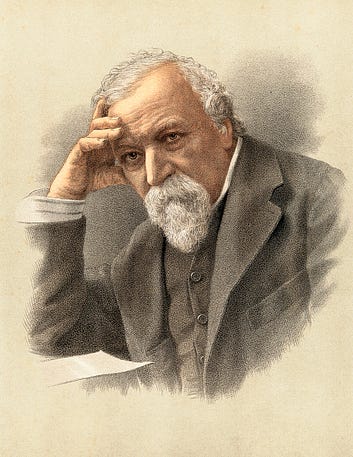|
 |
The Writer's Almanac from Tuesday May 7, 2013
"on my way to Santa Rosa" by Ingrid Swanberg, from Ariadne and Other Poems. © Bottom Dog Press, 2013.
ORIGINAL TEXT AND AUDIO - 2013
On this day in 1952, Geoffrey W.A. Dummer first presented the concept of the integrated circuit, also known as the microchip, which is the basis for all modern electronic equipment. The integrated circuit is an advanced form of the electrical circuit, which is made up of a set of components — a transistor, a resistor, a capacitor, and a diode — linked together in a variety of ways.
The transistor, which controls the electrical power — turning it on and off — was a big advance over the vacuum tubes used in the first computers. Vacuum tubes are like light bulbs: they generate a lot of heat, and they eventually burn out. They're also much bigger than their successors, the transistors. Early computers powered by hundreds of vacuum tubes were unreliable and required a lot of room, and the invention of the transistor in 1947 solved those problems. It had a few of its own, though, since each connection in the circuit had to be intact for it to work, and soldering all the circuits required to power a huge supercomputer was a very big job indeed. It also took time for the signal to travel through all the wires connecting the various components.
Geoffrey Dummer, who was a radar scientist working for Britain's Ministry of Defence, got the idea of making the various parts out of a single piece of silicon, which would eliminate the distance between components, speed up the signal, and do away with the need for precise soldering. It would also be smaller, enabling it to be fit into much smaller devices. He presented his paper at the U.S. Electronic Components Symposium; the Americans were willing to take a gamble on the idea, but the British government wasn't, and it was years before the United Kingdom had a semiconductor industry.
Today we rely on integrated circuits to run our computers, our phones, our watches, and our calculators. They're also used in microwaves, TVs, stereos, cars, refrigerators, and kids' toys. Pretty much anything you plug in is going to have at least one microchip in it.
Today's the birthday of British writer Angela Carter, born Angela Olive Stalker in Eastbourne, England, in 1940. Primarily a novelist, she also wrote poetry, short fiction, nonfiction, radio plays, and film adaptations, and she contributed articles to The Guardian, The Independent, and New Statesman. Her novels include The Magic Toyshop (1967), The Passion of New Eve (1977), and Nights at the Circus (1984).
She moved easily from magical realism to feminism to science fiction to gothic horror to surrealism in her work. Her short-story collection The Bloody Chamber (1979) was a sensual, feminist reinterpretation of classic European fairy tales. It was eventually adapted for radio, and then film, as The Company of Wolves.
She died of lung cancer in 1992, and Salman Rushdie wrote in The New York Times: "She was the first great writer I ever met, and she was one of the best, most loyal, most truth-telling, most inspiring friends anyone could ever have. I cannot bear it that she is dead."
It's also the birthday of Australian novelist Peter Carey, born in the little town of Bacchus Marsh, Victoria, in 1943. He worked in advertising during the 1960s, and most of his co-workers were writers or artists outside of work. That's when Carey began to read: Faulkner, Kafka, Kerouac, and Joyce. He started writing at night, like his friends, and he wrote for the next 13 years, producing four novels. All of them were rejected, but in 1974, his short-story collection, The Fat Man in History, made it to print and critical acclaim.
In 1976, he moved to a commune in Brisbane, where he would write for three weeks out of the month; for the fourth week he would fly to Sydney to work at his advertising job. He formed his own ad agency in 1981, with a partner who took on most of the day-to-day duties. Carey stopped in a couple of afternoons a week to do a bit of work, and spent the rest of his time writing. Between 1976 and 1990, he produced another short-story collection (War Crimes, 1979) and three novels: Bliss (1981), Illywhacker (1985), and Oscar and Lucinda (1988), for which he won the Booker Prize. He also won the Booker for True History of the Kelly Gang (2001), and is one of only two novelists — the other being J.M. Coetzee — to have won it twice. He's written 11 novels in all, and Australia's cultural self-image figures prominently in most of them. In America, his characters have been called "losers," but he calls them "battlers": "A battler," he explains, "is someone who struggles forever and will never, ever, really get anywhere. And in Australia that's a really honorable position."
It's the birthday of Victorian poet and playwright Robert Browning, born in Camberwell, England, in 1812. His mother was an accomplished pianist, and his father was a fairly well-off bank clerk whose personal library contained 6,000 books. Robert was educated at home and was a voracious reader from an early age. He loved the Romantic poets, especially Shelley, and at 14 he became an atheist and a vegetarian, to be more like his hero. Browning entered the University of London when he was 16, but grew annoyed at the slow pace within the first year and dropped out, preferring to pursue his own studies. He picked up lots of random information, and his poetry was sometimes criticized for its obscure references.
His relationship with fellow poet Elizabeth Barrett is one of the most famous in English literature. They began a prolific correspondence — hundreds of letters during their 20-month courtship — which began when he sent her fan mail. They eventually eloped, against her father's wishes, and moved to Italy. Browning's poetry was largely overshadowed by his wife's, at least during her lifetime. She was popular and successful, and a serious contender for the post of poet laureate in 1860, though that honor ultimately went to Tennyson. He generally received negative attention, if he received any attention at all. His long poem Paracelsus (1835) had been well-received, and gave him his entry into the London literary scene, but his follow-up, the experimental Sordello (1840), was ridiculed, and when he and Elizabeth moved to Italy, his critics beat him up for abandoning his homeland. Even his two-volume collection Men and Women — his most widely read work today — barely caused a ripple. He returned to London in 1861 after Elizabeth's death, and in 1868 he published his first real critical and commercial success, The Ring and the Book.
Browning also wrote several plays, none of them successful. But writing for the stage taught him how to use the dramatic monologue to reveal character, and he adapted it to his poetry. It became a defining characteristic of his work, and his most important and lasting contribution to the art, inspiring the likes of Ezra Pound, T.S. Eliot, and Robert Frost. He also inspired horror master Stephen King; Browning's "Childe Roland to the Dark Tower Came" (1855) was the springing-off point for the long-lived Dark Tower series, which King describes as his magnum opus.
Be well, do good work, and keep in touch.®
The APHC 50th Anniversary Tour leads up to the half-century milestone in the summer of 2024. On May 26th, Garrison and his rollicking troupe will be at the Akron Civic Theatre. Joining them are singers Heather Masse and Christine DiGiallonardo, the Royal Academy of Actors (Tim Russell, Sue Scott, and sound-effects wizard Fred Newman) will be there, along with music director/keyboardist Richard Dworsky leading the band.
If you are a paid subscriber to The Writer's Almanac with Garrison Keillor, thank you! Your financial support is used to maintain these newsletters, websites, and archive. If you’re not yet a paid subscriber and would like to become one, support can be made through our garrisonkeillor.com store, by check to Prairie Home Productions, P.O. Box 2090, Minneapolis, MN 55402, or by clicking the SUBSCRIBE button. This financial support is not tax deductible.


